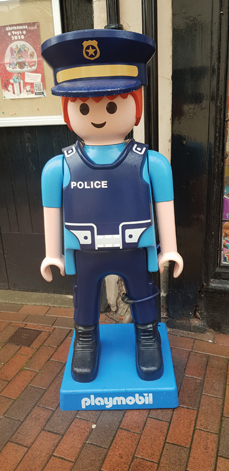The coming real-terms squeeze on police and criminal justice budgets has been analysed by Mark Rowe. Here he asks about police community support officers (PCSOs) – in a time of ‘austerity 2.0’ it’s arguable that their time has come; why then are they, at least in places, dwindling?
It’s either a good or a bad thing that beneath the basics of 999 emergency services – you pick up the phone if you’re reporting a fire, robbery or injured people in a car accident, and you expect fire, police or ambulance response – there’s variation in what the public gets from its police forces. Good in that the service may be responsive to local geography – a rural shire has different needs from a city conurbation. Bad, in that if you’re a national retailer you can’t be sure what service you’ll get across your sites, and nor can anyone.
PCSOs date from David Blunkett as Home Secretary in 2002, during what we can now see as Labour’s less than fully successful effort to reform the police. Proposals to regionalise forces (as succeeded in Scotland, where one force was created) came to nothing. The Coalition and then Conservative governments brought in new governance, elected police and crime commissioners; but the make-up of police forces – specials, community safety accredited officers (CSAS), another Labour invention of the 2000s – has been strikingly left unchanged since 2010, for all the other changes, in kit and officers forever expected to do ‘more with less’, as in other public services. The public worker trade union Unison claims a 45 per cent drop in PCSOs numbers in England since 2010 (Scotland and Northern Ireland don’t have PCSOs).
Whatever the rights and wrongs of that, arguably PCSOs, as far cheaper than constables with the power of arrest, might be coming into their own. Why then, to take the City of London force, has the initially taken on 52 PCSOs fallen first to 39 and after the 2012 London Olympics further to 16. And now as officers leave and aren’t replaced, there’s only four, and it’s looking doubtful that they’ll be replaced. The City force may be unrepresentative as about half of it deals with fraud; although as the Square Mile has changed in land use, it has more night-time entertainment.
Even if the City were still the stereotype high-rise offices and shops catering to office workers, there’s still scope for PCSOs, for the same reason as when David Blunkett brought them into being (against much opposition and snide remarks about ‘plastic police’). Response police officers dash from 999 job to job. They don’t have time to follow up. That can be the PCSO role, community policing, or as one PCSO put it, ‘drinking a lot of coffee’. It may lack the excitement of high-speed response, but by building (and maintaining) relationships, PCSOs can gather intelligence, besides reassuring the public.
Whether a shire or metropolitan police force has more or fewer PCSOs, and chooses to run their numbers down or not, says something about the kind of service that senior officers intend to deliver. The complaint about PCSOs was the same as about private prison warders; that they deskilled their sector and allowed drastic cuts in salaries. Again leaving aside the merits of that argument, it’s at least arguable that it makes sense all round, economic and civic, if PCOSs – paid less than constables, less trained and without the power of arrest – carry out community roles; foot patrol, handling anti-social behaviour and nuisance neighbour cases. Soft jobs, maybe, but what the public still expects (however unrealistically) to see the police carrying out. A PCSO may build up more experience and nous in resolving ASB than a constable, and retain more local knowledge about their patch than a response officer pulled everywhere and knowing nowhere particularly well.
The reason why PCSOs have not taken root may lie in a theory of organisations: because they do not have a career path; the path to success in policing is not via PCSOs, except maybe at the very start; no former PCSOs are reaching high rank to make a case for investing in them.
Or perhaps the PCSO role is simply too subtle for politicians; all the Boris Johnson-era Tory talk of an ‘uplift’ in police numbers was about constables. Or is the problem that whereas bobbies join the Police Federation, without the right to strike, PCSOs can join a trade union, typically Unison?









